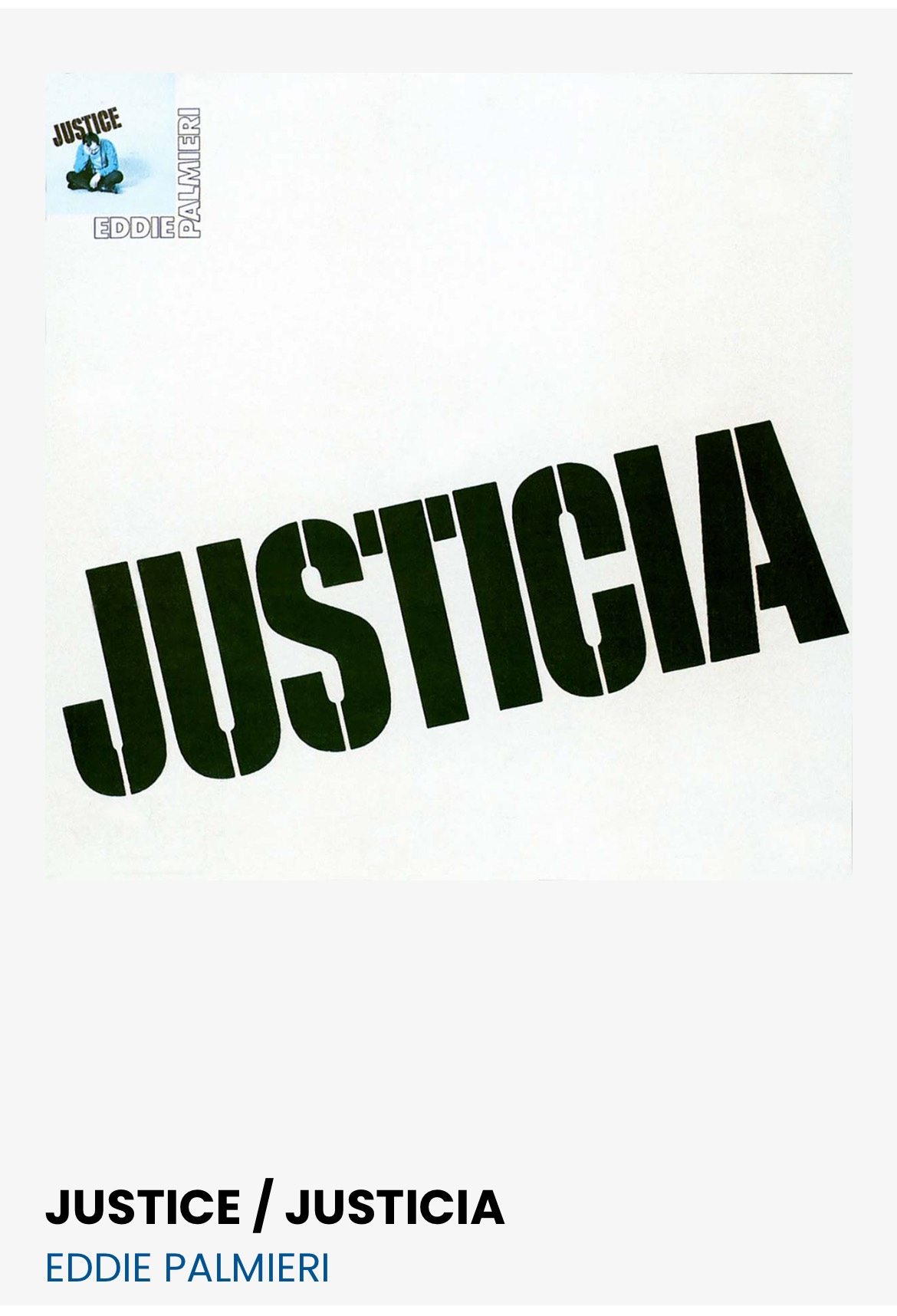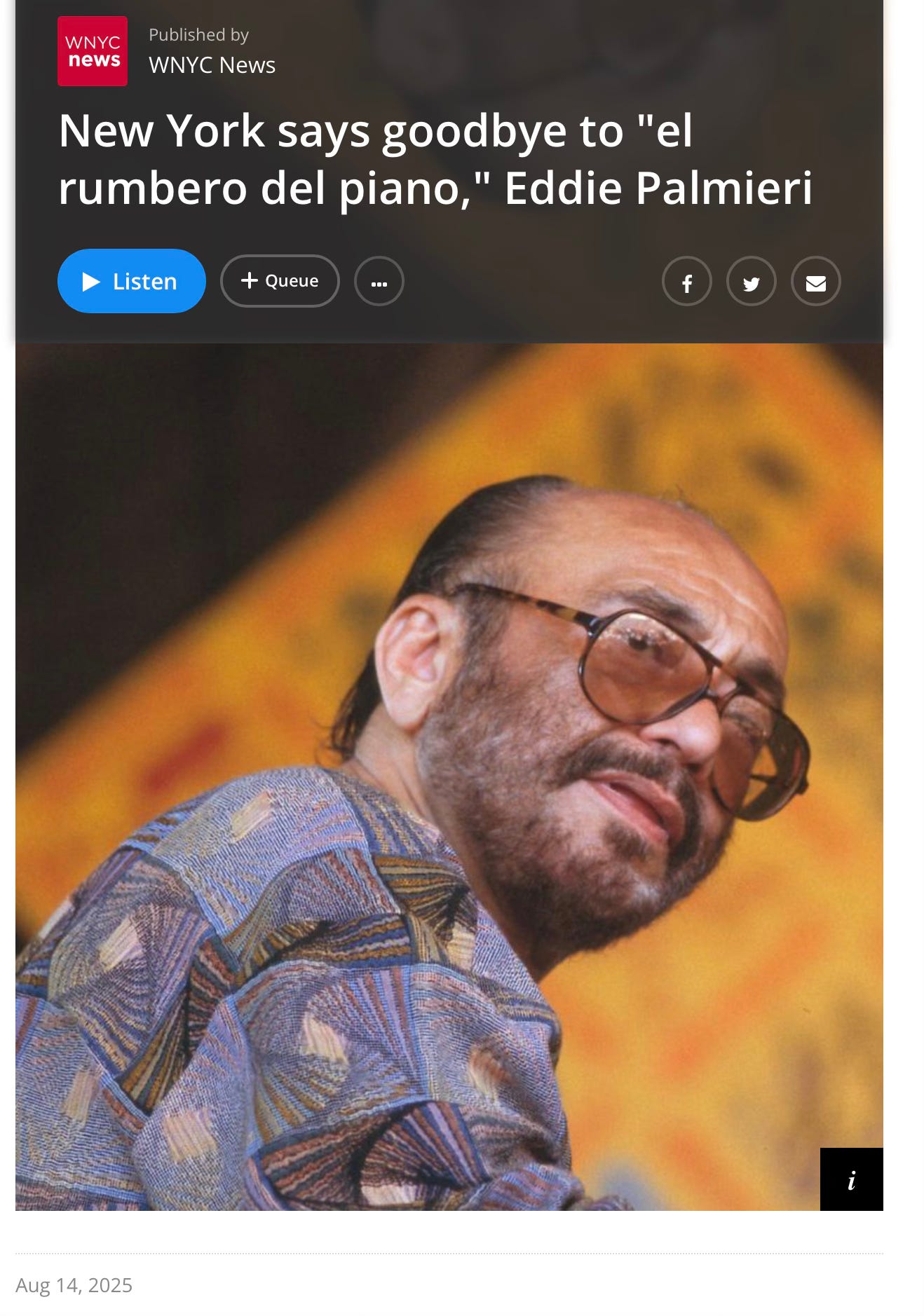Palmieri’s “Gotcha” to the World
From Lincoln Center to Spike Lee, Palmieri’s Legacy is East Harlem River Rooted.

He wanted to be the Last Man Standing, and so, the General of Nuyorican music and culture was draped in red, white, and blue flowers designed like the Boricua flag. Crimson roses for Chango dotted the room at the Campbell funeral parlor, where Eduardo Palmieri rested. His gloved hands held a rosary as a Young Lords Party pin shone from his lapel. He looked rested, smiling, taking a break before rising to play the grand piano beside him.
I crossed myself in rosary respect, then knelt and chanted a Buddhist effect before standing and shaking with Regla de Ocha Orisha vibes dancing in clave around us.
Rest In Peace, Light and Power!
"Eddie Palmieri was unpredictable. He was controversial, but he was an exponent, co-creator, and defender of this genre. He creatively expanded the Afro-Caribbean form, including its Boricua folkloric elements of plena and bomba music.”
Homages to the Latin music, NEA Jazz Master and ten-time Grammy Winner Eddie Palmieri poured in from around the world. From Broadway’s Ed Sullivan Theater, Stephen Colbert’s The Late Show Band, led by Louis Cato, played a Palmieri medley. Lincoln Center erupted in explosive shouts, and sang along when Jon Batiste broke out, locked and loaded in full Palmieri musical gear. Rolling Stone suggested songs, while the N.Y Times had his extensive obit ready to go that very day. Spike Lee released “Highest 2 Lowest,” featuring an appearance by the man himself, Eddie Palmieri.
Even GenZs had something to learn and something to say about our cutting-edge madman of salsa. Take a look at this young influencer, Edison:
And our very own WNYC chimed in with this little segment where I gave my take on Eddie Palmieri. Just click here to hear:

The funeral was packed with old friends and new. Charlie Candelario, who designed the Palmieri cover of his unattached hand, ala Wednesday’s Thing, hovering over the keyboards, wheeled himself in, his album cover designs on his lap. Or Ricardo Marrero and his wife, Lucy, who greeted us as we walked in. The Palmieri’s were the most gracious, welcoming, and loving. From the eldest who cared for him in his last days to the youngest I hadn’t seen since she really was about ten years old, their attentive approach and response to the spectacle was a source of both solace and emotional tears. His son, an uncanny, almost identical copy of his father, worked the room, greeting family, friends, promoters, collaborators, artists, journalists, and writers.
We got there early, leaving a few hours later for an early dinner. There were a few television stations outside, but the police barriers that had previously stood to keep out the boisterous fans had already been taken down. I remember when Celia Cruz had her wake here. Fans staked out the night before—a double line of fans wrapped around Madison Avenue from 80th to 81st and Fifth. People stood in lines with bags of sugar, playing maracas and portable radios blasting her songs. The tonied Upper East Side community bitched very loudly, even though they couldn’t do a damn thing. That was our Queen! Now it was Eddie’s turn, but he never wanted to be King. He was super clear when he responded to a Miami Herald reporter who asked, after Tito Puente passed, if he was now the new King of Latin Music. Palmieri, in his inimitable style, candidly replied, “I’m really more the pimple on the King’s ass!”
So I wasn’t surprised that there weren’t throngs of folks around. Most times, they’re just mugging for the cameras like the ones roaming out there when we stepped out. Or the folks waiting for a chance to speak, to be heard, and to be recorded. The Palmieri’s embraced and kissed me, invited me to attend the service as family the following day. But I had already paid my respect and condolences to the familia. I had already said goodbye to Eddie.
But I will say this. I always had mad respect for Eddie for not only rejecting the entire royalty bullshit of King, Queen, etc., but also for always saying he was a never-ending student, or rather, scholar, of this music.
Eduardo Palmieri, who played the 88s and passed at 88, will live, as his music, in infinity ∞ !
I’ll leave you now with this last little clip Eddie made for me during the pandemic. As an East Harlem Holiday Tree Committee volunteer, I produced a tour of the community with Eddie waxing poetic on the neighborhood that watched him come into this world. With all of his global travels, Spanish Harlem was always the cradle of his youth and where the footprints of the Palmieri Brothers are branded into these mean musical streets. This is his own personal “gotcha!”




Gracias Aurora for taking us on this trip through the magic of Maestro Eddie’s cantos.
Sparkling Eddie and his generation were our heroes in 1961 when in high school we danced to La perfecta and all the other groups of musicians and singers not much older than us.
Eddie stood out as an elder brother who could make us spin and comfort each other dancing as he took us on a trip through his latest number with its expanded traditional chords and breaks.
We dressed like them, sought out all the chisme gossip about who was leaving what band why and for where. In Effect , we were boy groupies trying to Maintain our cool, like them on stage. He helped us make it through the week.
Buen viaje hermano maestro. Gracias for all the roller coaster rides through the magic of your melodies and the inspirations of your lyrics. Ache Ashe Amen.
Thank you Aurora for this beautiful and intimate tribute - and for your description of the wake in such perfect detail. Telling it like it is, as you always do.